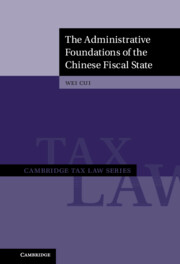Book contents
- The Administrative Foundations of the Chinese Fiscal State
- Cambridge Tax Law
- The Administrative Foundations of the Chinese Fiscal State
- Copyright page
- Dedication
- Contents
- Figures
- Tables
- Acknowledgments
- Abbreviations
- Introduction
- 1 The Forgotten Reform
- 2 What Is an Audit?
- 3 Atomistic Coercion
- 4 Returning Responsibilities to Taxpayers
- 5 Organizing Revenue
- 6 Policy Making without Information
- 7 The Rhetoric of Law
- 8 Varieties of State Capacity
- 9 Pivoting Away from the Rule of Law
- References
- Index
8 - Varieties of State Capacity
Published online by Cambridge University Press: 24 March 2022
- The Administrative Foundations of the Chinese Fiscal State
- Cambridge Tax Law
- The Administrative Foundations of the Chinese Fiscal State
- Copyright page
- Dedication
- Contents
- Figures
- Tables
- Acknowledgments
- Abbreviations
- Introduction
- 1 The Forgotten Reform
- 2 What Is an Audit?
- 3 Atomistic Coercion
- 4 Returning Responsibilities to Taxpayers
- 5 Organizing Revenue
- 6 Policy Making without Information
- 7 The Rhetoric of Law
- 8 Varieties of State Capacity
- 9 Pivoting Away from the Rule of Law
- References
- Index
Summary
Chapter 8 explores the implications of the book’s narratives for the study and practice of taxation in developing countries. China has adopted taxes that are designed to be administered through self-assessment, while minimizing reliance on self-assessment. This essential modification of the modern tax paradigm has radical implications. First, it suggests substantial revisions to economic theories of tax administration and compliance. In particular, because self-assessment is quintessentially about complying with legal norms, modern taxation is deeply intertwined with legal systems: the Chinese case demonstrates how profoundly different a tax system is when severed from the legal system’s support – an idea that economic theories have ignored. Second, the evolution of Chinese tax administration both affirms and enriches a theory in political economy, namely that, to properly study tax and development, one must consider not only state capacity in tax collection, but also view such state capacity as endogenous with politics. Finally, one may query whether Chinese taxation will converge with more familiar tax paradigms. I argue that, to the contrary, technological developments could strengthen the tendency of China’s tax system to continue on its recent path; one can even ask whether other countries will converge to China’s model.
Keywords
- Type
- Chapter
- Information
- The Administrative Foundations of the Chinese Fiscal State , pp. 227 - 253Publisher: Cambridge University PressPrint publication year: 2022

